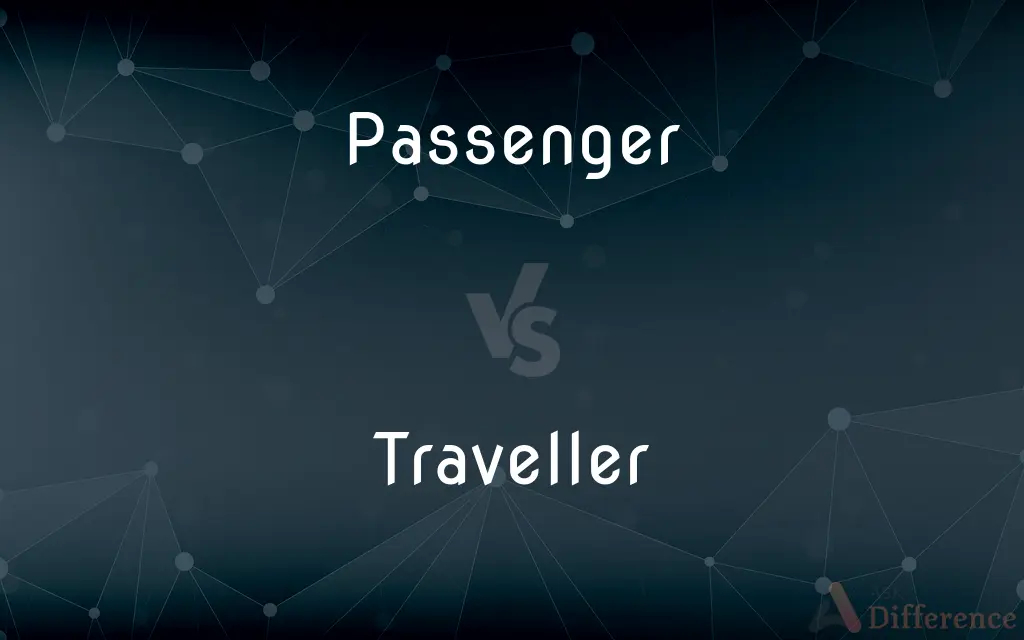Passenger vs. Traveller — What's the Difference?
By Tayyaba Rehman — Updated on October 30, 2023
A passenger is someone who travels in a vehicle without controlling it, while a traveller is one who goes on journeys or explores new areas.

Difference Between Passenger and Traveller
Table of Contents
ADVERTISEMENT
Key Differences
A passenger is typically someone who is transported in a vehicle, such as a car, bus, train, or plane, and does not take part in the vehicle's operation. This term focuses on the mode of transportation and implies a degree of passivity. Passengers are often associated with routine travel or commuting, where the journey's purpose is to reach a destination rather than the experience of travel itself.
On the flip side, a traveller is someone who goes on a trip or a journey, which may imply a longer duration, greater distance, or a purpose of exploration and experience. The emphasis is on the act of travel as an experience or adventure. Travellers are often perceived as individuals seeking new experiences, learning about different cultures, or traveling for pleasure rather than necessity.
Passengers are bound by the schedules and routes of their chosen mode of transportation. They tend to be customers of a transportation service, adhering to the rules and requirements of the service provider. Travelling as a passenger often involves purchasing a ticket and may be a part of daily life, such as commuting to work or school.
In contrast, travellers have more autonomy in their movements. They may choose unconventional paths or modes of travel, such as hiking or cycling. The term 'traveller' suggests a level of curiosity and engagement with the journey and destinations. Travelling, in this sense, is about the breadth of experiences and personal growth.
While all passengers are travellers in the general sense of moving from one place to another, not all travellers are passengers. A traveller might embark on a journey using various modes of transportation, including driving themselves or even walking, whereas a passenger is not in control of the vehicle they are in.
ADVERTISEMENT
Comparison Chart
Definition
A person who travels in a vehicle
A person who goes on journeys
Role
Non-controlling occupant
Explorer, journeyer
Purpose
Reaching a destination
Experience of journey, exploration
Autonomy
Limited by vehicle's operation
Autonomous in travel decisions
Connotation
Routine, commuter
Adventure, exploration
Compare with Definitions
Passenger
A passenger uses public or private transit.
Passengers were instructed to evacuate the bus.
Traveller
A traveller goes on long voyages.
The traveller set sail across the Atlantic with only the stars to guide him.
Passenger
A passenger holds a ticket for travel.
The train conductor checked each passenger's ticket.
Traveller
A traveller visits multiple countries.
The seasoned traveller had stories from every continent.
Passenger
A passenger rides in a vehicle.
The passenger fastened her seatbelt as the plane took off.
Traveller
A traveller seeks adventure.
Every mountain summit brought the traveller a new sense of accomplishment.
Passenger
A passenger (also abbreviated as pax) is a person who travels in a vehicle but bears little or no responsibility for the tasks required for that vehicle to arrive at its destination or otherwise operate the vehicle. The vehicles may be bicycles, buses, passenger trains, airliners, ships, ferryboats, and other methods of transportation.
Traveller
A traveller embarks on journeys.
The traveller packed her bag for a year-long journey around the world.
Passenger
A person who travels in a conveyance, such as a car or train, without participating in its operation.
Traveller
One who travels or has traveled, as to distant places.
Passenger
(Informal) A person who participates only passively in an activity.
Traveller
A traveling salesperson.
Passenger
(Archaic) A wayfarer or traveler.
Traveller
A member of any of various groups of traditionally itinerant people living especially in Scotland and Ireland.
Passenger
One who rides or travels in a vehicle, but who does not operate it and is not a member of the crew.
Traveller
A metal ring that moves freely back and forth on a rope, rod, or spar.
Passenger
Somebody in a team who does not do their fair share of the work.
Traveller
The rope, rod, or spar on which such a ring moves.
Passenger
(falconry) A young hunting bird that can fly and is taken while it is still in its first year.
Traveller
A carriage that slides on a transverse track near the stern of a sailboat, providing an adjustable point of attachment for the mainsheet block.
Passenger
(obsolete) A migratory bird, a bird of passage.
Traveller
One who travels, especially to distant lands.
Passenger
(obsolete) A passer-by; a wayfarer.
Traveller
(dated) A salesman who travels from place to place on behalf of a company.
Passenger
(obsolete) A ship carrying passengers, a ferryboat.
Traveller
(British) Someone who lives (particularly in the UK) in a caravan, bus or other vehicle rather than a fixed abode.
Passenger
A moth, Dysgonia algira
Traveller
(Ireland) Traveller
Passenger
(military) Any of the individual warheads of a MIRV missile.
Traveller
A list and record of instructions that follows a part in a manufacturing process.
Passenger
(intransitive) To ride as a passenger in a vehicle.
Traveller
(electrical engineering) One of the wires connecting the two members of a pair of three-way switches.
Passenger
A passer or passer-by; a wayfarer.
Traveller
(nautical) A metal ring that moves freely on part of a ship’s rigging.
Passenger
A traveler by some established conveyance, as a coach, steamboat, railroad train, etc.
Traveller
A rail or track for a sliding curtain.
Passenger
A traveler riding in a vehicle (a boat or bus or car or plane or train etc) who is not operating it
Traveller
(bridge) A sheet of paper that is circulated with the board of cards, on which players record their scores.
Passenger
A passenger often travels regularly.
Morning passengers crowded the subway platform.
Traveller
A styrofoam cup filled with liquor and usually ice, to be taken away from a place.
Passenger
A passenger is not driving the vehicle.
He was just a passenger in the car accident.
Traveller
A person who changes location
Traveller
A traveller explores new places.
The traveller studied the map of the ancient ruins carefully.
Common Curiosities
Can a passenger be a traveller?
Yes, a passenger can be a traveller if they are on a journey.
What defines a passenger?
A passenger is defined as someone who travels in any mode of transportation without operating it.
Who is a traveller?
A traveller is a person who goes on trips or exploratory journeys.
What's the primary difference between a passenger and a traveller?
The primary difference lies in the engagement with the journey and control over the travel experience.
Is a hitchhiker a passenger or a traveller?
A hitchhiker is a passenger when riding without operating the vehicle but is also a traveller seeking adventure.
Are there different types of passengers?
Yes, there are different types, including airline, train, and bus passengers, each with specific regulations to follow.
Do all passengers need a ticket?
Most passengers need a ticket for commercial transportation services.
Is a traveller always a passenger?
No, a traveller isn't always a passenger, as they may travel by their own means.
Are passengers responsible for navigating?
Typically, passengers are not responsible for navigating the vehicle they are in.
Why do people travel as passengers?
People travel as passengers for convenience, necessity, or as part of their daily routine.
What kind of experiences might a traveller seek?
Travellers may seek cultural, adventurous, or nature-related experiences.
Do travellers always go far distances?
No, travellers can also explore local areas or go on short journeys.
Can someone be a traveller in their own city?
Yes, one can be a traveller by exploring and experiencing new aspects of their own city.
Share Your Discovery

Previous Comparison
Amen vs. Omen
Next Comparison
Expositive vs. ExpositoryAuthor Spotlight
Written by
Tayyaba RehmanTayyaba Rehman is a distinguished writer, currently serving as a primary contributor to askdifference.com. As a researcher in semantics and etymology, Tayyaba's passion for the complexity of languages and their distinctions has found a perfect home on the platform. Tayyaba delves into the intricacies of language, distinguishing between commonly confused words and phrases, thereby providing clarity for readers worldwide.
















































